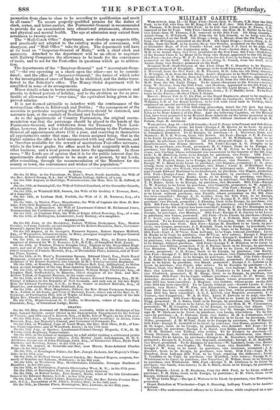etrauings firm t4r %tut %nal
THE POST-OFFICE.
The "Report upon the Post-office, 1854," bearing the names of " Elcho, Stafford H. Northeete, C. E. Trevelyan, E. A. Hoffay," to- gether with the suggestions of Lord Canning the Postmaster-General, and the decision of the Lords of the Treasury, was submitted to both Houses shortly before the prorogation. It presents a scheme for remodelling the entire Metropolitan establishment, with some minor exceptions ; and the details are the more valuable seeing that they are likely to be acted upon without loss of time.
At the head of the central establishment stands the Postmaster-General. No change is proposed in so far as that officer is concerned. Under him range two Secretaries, two Assistant-Secretaries, and numerous clerks. These constitute what is called the "Secretary's Office." The two Se- cretaries are of "equal rank and of independent authority" ; and incon- venience has arisen from the anomaly. It is intended to abolish one of the Secretaryships, and to remodel the office. "The permanent esta- blishment should consist of a single Secretary, at a salary of 15001., rising in five years to 20001.; two Assistant-Secretaries, at salaries rising from 700/. to 10001. by an annual progression of 501.; and a sufficient number of clerks, who should be divided, we think, into three classes, and should be charged with the execution of such duties of the Depart- ment as require the exercise of superior intelligence." Salaries beginning at 400/., and rising by 201. a year to a maximum of 5001., to be allotted to clerks of the first class. The second class to commence at 260/., and increase by 151. a year to 3001.; and the third class, beginting at 1201. to rise by 101. a year to 2401. The vacancies in each class to be supplied from the class below it; and the vacancies in the lowest class to be filled by selection from the whole establishment of the Post-office. Thus arranged, the "Secretary's Office" may be considered as containing the prizes of the entire establishment ; towards the attainment of some one of which the humblest letter-sorter or letter-carrier may aspire. This view is put prominently forth by the gentlemen who have drawn up the report. Other important changes are proposed, and will be carried out, in the Inland Office and the London District Office (employed in delivering and charging letters and newspapers in London and its immediate neighbour- hood, and in despatching the mails to all quarters) ; the Mail-Coach Office (intrusted with the modes of conveyance) ; the Dead-Letter Office (charged with such letters as fail to reach the persons intended). The proposal is to consolidate the three offices, the Inland Office, the London District Office, and the Dead-Letter Office ; the united department to be placed under one officer, to bear the title of "Controller of the Inland Office," with a Vice-Controller, Deputy-Controllers, and clerks to assist. Under them stands the whole body of sorters, letter-carriers, stampers, porters, messengers, &c. ; to be divided into four classes, the lowest be- ginning at 19s. a week, and rising by an annual addition of 18. a week to 23s.; the highest beginning at 40e., and rising to 503. a week : "the promotion from class to class to be according to qualification and merit in all cases." To secure properly-qualified persons for the duties of clerk, sorter, and letter-carrier, the Postmaster-General is recommended to provide for an examination into educational attainments, character, and physical and mental health. The age at adroi,t4on may extend from seventeen to twenty-seven. The "Mail-Coach Office" department, now obsolete as respects title, and practically not adapted to the existing modes of conveyance, will disappear, and "Mail Office" take its place. The department will have at its head an "Inspector-General of Mails," with a chief clerk and assistants. Attached to the department will be an officer to negotiate with Railway Companies the allowance, to be'made for the conveyance of mails, and to act for the Post-office in questions which go to arbitra- tion.
The departments of the "Receiver-General" and " Accountant-Gene- ral "—the one operating as a check upon the other—are to be consoli- dated; and the office of "Inspector-General," the duties of which refer to the investigation of cases of fraud, to be abolished, and the duties trans- ferred to the Solicitor's office. The Money-Order department will be simplified in some of its arrangements.
Minor details relate to better retiring allowances to letter-carriers and guards, to defined periods of holiday, and to the abolition as far as prac- ticable of allowances for "over-time," the equivalent being given in im- proved salaries.
It is not deemed advisable to interfere with the continuance of the metropolitan offices in Edinburgh and Dublin ; "the management of the accounts in particular requiring that Receivers should be stationed, and aoeounts kept, at the capitals of Scotland and Ireland."
As to the appointment of Country Postmasters, the original recom- mendation was that the patronage should be placed in the hands of the Postmaster-General, and withdrawn from the Treasury. Their Lord- ships, however, draw a line of distinction, transferring to the Postmaster- General all appointments above 175/. a year, and reserving to themselves all appointments under that sum; the reason assigned being, that in the higher salaries the office is held unconnected with any other business, and is therefore available for the reward of meritorious Post-office servants ; while in the lower grades the office must be held conjointly with some other business, and a local person must have the appointment. In these cases, "My Lords are of opinion that it is for the public interest that the appointments should continue to be made as at present, by my Lords, after consulting, through the recommendation of the Members for the county or town, the convenience and wishes of the population."



























 Previous page
Previous page